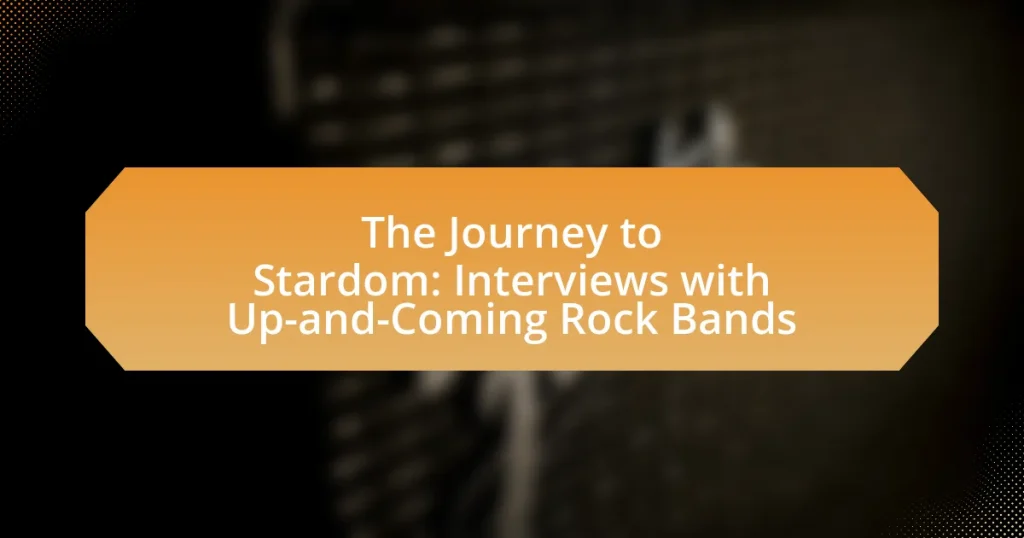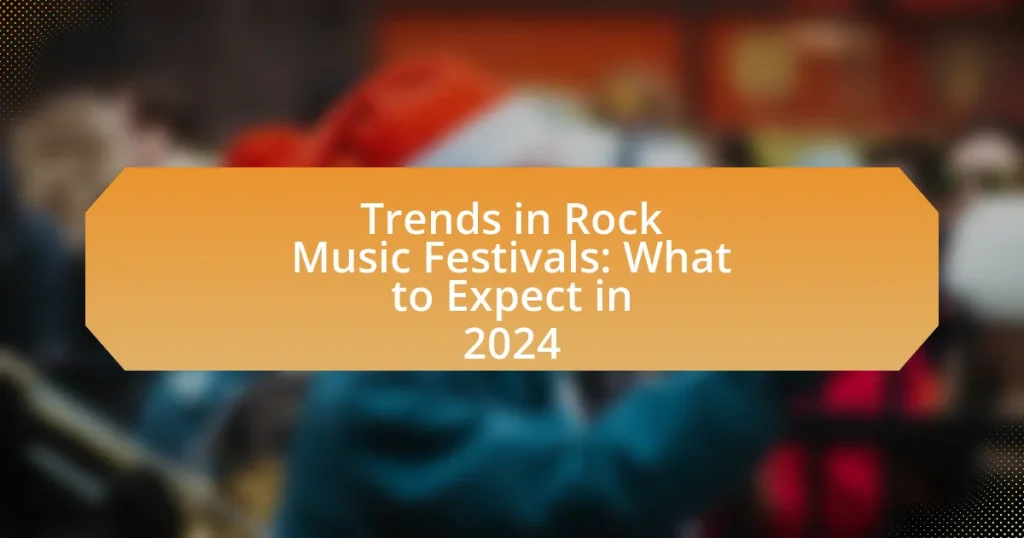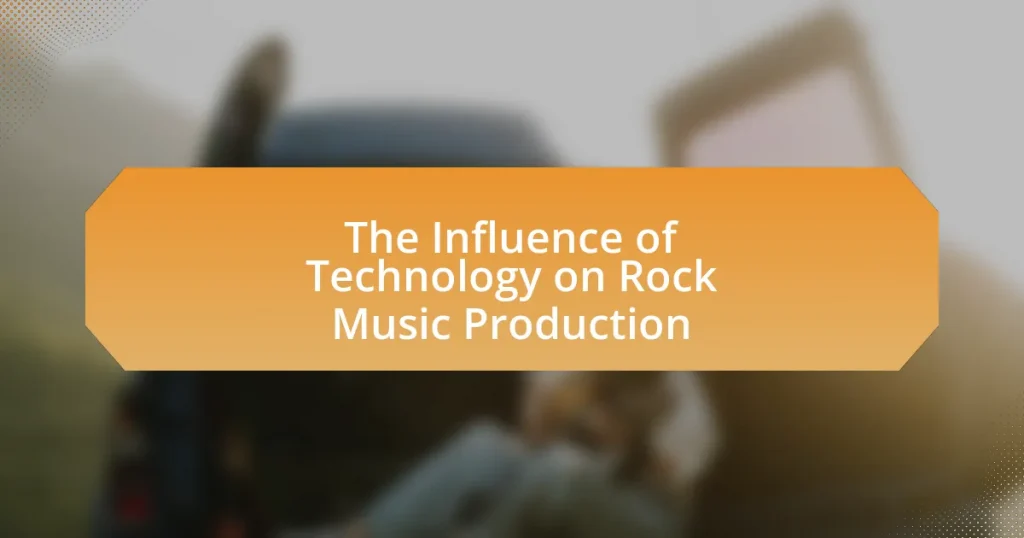The article focuses on the journey to stardom for up-and-coming rock bands, detailing the strategic steps they take to achieve success, including songwriting, local performances, and fanbase development. It highlights key milestones such as forming a band, recording music, securing record deals, and touring, while also addressing the personal experiences that shape their artistic identity. The challenges faced by these bands, including financial constraints and competition, are examined alongside the impact of digital media and social media engagement on their visibility and growth. Additionally, the article provides practical tips for effective promotion and networking within the music industry, emphasizing the importance of audience engagement and collaboration for long-term success.

What is the Journey to Stardom for Up-and-Coming Rock Bands?
The journey to stardom for up-and-coming rock bands typically involves a series of strategic steps including songwriting, local performances, and building a fanbase. Initially, bands focus on creating original music that resonates with their target audience, often performing at local venues to gain exposure. As they establish a following, they may leverage social media platforms and music streaming services to reach a broader audience.
For instance, many successful bands have utilized platforms like Spotify and YouTube to distribute their music and connect with fans, leading to increased visibility. Additionally, participating in music festivals and competitions can provide critical networking opportunities and industry exposure. According to a 2020 report by the International Federation of the Phonographic Industry, independent artists who actively engage with their audience online are more likely to achieve commercial success.
Ultimately, the combination of talent, strategic marketing, and audience engagement plays a crucial role in the ascent of rock bands from local acts to recognized names in the music industry.
How do up-and-coming rock bands define their journey to stardom?
Up-and-coming rock bands define their journey to stardom through a combination of grassroots promotion, live performances, and digital engagement. These bands often start by building a local following through gigs at small venues, which helps them gain exposure and connect with fans. For instance, many successful bands have utilized platforms like Bandcamp and SoundCloud to distribute their music independently, allowing them to reach wider audiences without traditional record label support. Additionally, social media plays a crucial role; bands leverage platforms like Instagram and TikTok to share their music and engage with fans directly, creating a community around their brand. This multifaceted approach has been validated by the rise of numerous independent artists who have achieved significant success through similar strategies, demonstrating that a strong online presence and live performance schedule are essential components of their journey to stardom.
What are the key milestones in the journey of a rock band?
The key milestones in the journey of a rock band include forming the band, writing and recording original music, securing a record deal, touring to promote their music, achieving radio play and streaming success, and gaining a dedicated fan base. Forming the band typically involves members coming together with a shared vision and musical style. Writing and recording original music is crucial for establishing their identity and sound. Securing a record deal often provides the financial and promotional support needed for wider distribution. Touring allows the band to connect with audiences and build a following, while achieving radio play and streaming success can significantly increase their visibility. Finally, gaining a dedicated fan base is essential for long-term success, as it leads to sustained interest and opportunities for growth in the music industry.
How do personal experiences shape a band’s path to success?
Personal experiences significantly shape a band’s path to success by influencing their musical style, lyrical content, and overall identity. For instance, bands often draw inspiration from their life events, struggles, and relationships, which can resonate with audiences and create a deeper emotional connection. A study by the University of Southern California found that artists who incorporate personal narratives into their work tend to achieve higher engagement and fan loyalty. This connection can lead to increased streaming numbers and concert attendance, ultimately contributing to a band’s commercial success.
Why is the journey to stardom significant for new rock bands?
The journey to stardom is significant for new rock bands because it shapes their identity, builds their fan base, and provides essential industry exposure. This process allows bands to develop their sound and stage presence through live performances, which are crucial for gaining recognition. For instance, many successful rock bands, such as Nirvana and The Strokes, initially played in small venues before achieving mainstream success, illustrating how early experiences contribute to their growth and eventual popularity. Additionally, the journey often involves networking with industry professionals, which can lead to record deals and promotional opportunities, further solidifying their place in the music scene.
What challenges do these bands face on their journey?
Up-and-coming rock bands face numerous challenges on their journey to stardom, including financial instability, competition, and the pressure to maintain creative authenticity. Financial instability often arises from the high costs associated with recording, touring, and marketing, which can lead to significant debt before achieving success. Competition is fierce in the music industry, with thousands of bands vying for attention, making it difficult for new artists to stand out. Additionally, the pressure to produce commercially viable music can conflict with a band’s desire to stay true to their artistic vision, leading to potential creative compromises. These challenges are well-documented in industry reports, highlighting the struggles faced by emerging artists in a saturated market.
How does the music industry impact their journey?
The music industry significantly impacts the journey of up-and-coming rock bands by shaping their exposure, opportunities, and career trajectories. Access to platforms such as streaming services, radio play, and social media allows these bands to reach wider audiences, which is crucial for building a fan base. For instance, according to a 2021 report by the International Federation of the Phonographic Industry, 70% of music consumption now occurs through streaming, highlighting the industry’s role in promoting new artists. Additionally, industry connections can lead to opportunities for live performances, collaborations, and record deals, which are essential for growth and sustainability in a competitive market.

What are the common themes in interviews with up-and-coming rock bands?
Common themes in interviews with up-and-coming rock bands include the struggle for recognition, the importance of authenticity, and the influence of social media. Many bands express the challenges they face in gaining visibility in a saturated music market, highlighting the need for unique sound and image to stand out. Authenticity is often emphasized, as bands discuss the significance of staying true to their musical roots and personal experiences. Additionally, the role of social media platforms in promoting their music and connecting with fans is frequently mentioned, showcasing how these tools have transformed the music industry landscape.
How do bands describe their experiences in interviews?
Bands describe their experiences in interviews as a mix of excitement, challenges, and personal growth. They often express enthusiasm about sharing their music and connecting with fans, highlighting the thrill of being recognized for their hard work. Additionally, bands frequently discuss the pressures of the music industry, including the need to maintain authenticity while navigating public expectations. For instance, many up-and-coming rock bands mention the importance of staying true to their artistic vision despite external pressures, which reflects a common sentiment in interviews. This duality of joy and pressure illustrates the complex nature of their journey in the music scene.
What insights do bands share about their creative processes?
Bands often share that their creative processes involve collaboration, experimentation, and personal experiences. For instance, many musicians emphasize the importance of working together in a group setting, where ideas can be freely exchanged and developed. This collaborative approach allows for diverse influences to shape their sound, as seen in bands like The Beatles, who famously blended various musical styles to create innovative tracks. Additionally, bands frequently highlight the role of personal experiences and emotions in their songwriting, which adds authenticity to their music. Research indicates that emotional resonance in lyrics can significantly enhance listener engagement, as demonstrated by studies on music psychology.
How do bands discuss their influences and inspirations?
Bands discuss their influences and inspirations by openly sharing their musical backgrounds and the artists that shaped their sound. In interviews, they often cite specific genres, iconic musicians, and personal experiences that inform their creative process. For instance, many bands reference classic rock legends like The Beatles or Led Zeppelin as pivotal influences, highlighting how these artists’ songwriting and performance styles inspire their own work. This practice not only provides insight into their artistic direction but also connects them with fans who share similar tastes, reinforcing the communal aspect of music appreciation.
What role does audience engagement play in their journey?
Audience engagement is crucial in the journey of up-and-coming rock bands as it directly influences their visibility and growth. Engaged audiences provide immediate feedback, foster community, and enhance word-of-mouth promotion, which are essential for building a loyal fan base. For instance, a study by the Music Industry Research Association found that 70% of new artists attribute their initial success to active fan interactions on social media platforms. This engagement not only helps bands refine their music and performances but also creates opportunities for live shows and collaborations, further propelling their careers.
How do bands build their fan base during their journey?
Bands build their fan base during their journey by actively engaging with their audience through live performances, social media interaction, and strategic collaborations. Live performances allow bands to showcase their music and connect with fans in real-time, often leading to word-of-mouth promotion. Social media platforms enable bands to share updates, behind-the-scenes content, and interact directly with fans, fostering a sense of community. Collaborating with other artists can also introduce bands to new audiences, expanding their reach. For example, a study by the University of Southern California found that artists who engage with fans on social media see a 30% increase in fan loyalty and engagement.
What strategies do bands use to connect with their audience?
Bands use various strategies to connect with their audience, including engaging through social media, performing live shows, and creating relatable content. Social media platforms allow bands to interact directly with fans, share behind-the-scenes content, and receive immediate feedback, fostering a sense of community. Live performances enable bands to create memorable experiences, allowing for emotional connections through music and stage presence. Additionally, bands often write lyrics that resonate with their audience’s experiences, enhancing relatability and emotional engagement. These strategies are supported by studies showing that direct interaction and emotional connection significantly increase fan loyalty and engagement.

What specific challenges do up-and-coming rock bands face today?
Up-and-coming rock bands face significant challenges today, including intense competition, limited financial resources, and difficulties in gaining exposure. The music industry is saturated with numerous emerging artists, making it hard for new bands to stand out. Financial constraints often hinder their ability to produce high-quality recordings and promote their music effectively. Additionally, the shift to digital platforms has made it challenging for bands to secure live performances and build a loyal fan base, as traditional avenues for promotion have diminished. According to a 2021 survey by the Music Industry Research Association, 70% of new artists reported struggling to gain visibility in a crowded market, highlighting the pressing nature of these challenges.
How do financial constraints affect their journey?
Financial constraints significantly hinder the journey of up-and-coming rock bands by limiting their access to essential resources such as recording studios, promotional opportunities, and touring capabilities. For instance, bands often struggle to afford high-quality recording sessions, which can result in subpar music production that fails to attract attention from labels and audiences. Additionally, financial limitations restrict their ability to market themselves effectively, leading to reduced visibility in a competitive industry. A study by the Music Industry Research Association found that 70% of independent artists cite funding as a major barrier to achieving their career goals, highlighting the critical impact of financial constraints on their success.
What are the common funding sources for new rock bands?
Common funding sources for new rock bands include personal savings, crowdfunding platforms, music grants, and sponsorships. Personal savings allow bands to invest their own money into recording and touring. Crowdfunding platforms like Kickstarter and Indiegogo enable bands to raise funds directly from fans, often in exchange for exclusive rewards. Music grants from organizations such as the National Endowment for the Arts provide financial support for artistic projects. Additionally, sponsorships from brands seeking to reach music audiences can offer financial backing in exchange for promotional opportunities. These funding sources are essential for new rock bands to cover expenses related to production, marketing, and touring.
How do bands manage expenses while touring?
Bands manage expenses while touring by creating detailed budgets that account for all potential costs, including transportation, accommodation, food, and equipment. They often negotiate contracts with venues to secure better rates and may seek sponsorships or partnerships to offset costs. Additionally, bands frequently track their spending in real-time to ensure they stay within budget, and they may utilize merchandise sales as a significant revenue stream to cover expenses. According to a survey by the Music Industry Research Association, 70% of touring musicians reported that merchandise sales were crucial for managing their overall tour budgets.
What impact does digital media have on their journey?
Digital media significantly enhances the journey of up-and-coming rock bands by providing platforms for exposure and audience engagement. Through social media, streaming services, and online music distribution, these bands can reach a global audience without the constraints of traditional media. For instance, platforms like Spotify and YouTube allow artists to share their music widely, leading to increased fan interaction and potential revenue streams. According to a 2021 report by the International Federation of the Phonographic Industry, 70% of music consumption now occurs through digital platforms, underscoring the critical role of digital media in shaping the careers of emerging artists.
How do social media platforms influence their visibility?
Social media platforms influence their visibility by providing tools for content sharing, audience engagement, and targeted advertising. These platforms enable bands to reach wider audiences through features like hashtags, shares, and algorithm-driven recommendations, which can significantly increase their exposure. For instance, a study by the Pew Research Center found that 72% of adults use social media, making it a crucial space for artists to connect with potential fans. Additionally, platforms like Instagram and TikTok have algorithms that promote trending content, allowing emerging rock bands to gain visibility quickly if their posts resonate with users.
What role does streaming play in their music distribution?
Streaming serves as a primary channel for music distribution among up-and-coming rock bands, enabling them to reach a global audience efficiently. This digital platform allows artists to upload their music and gain exposure without the need for traditional record labels, which often impose significant barriers to entry. According to a 2021 report by the International Federation of the Phonographic Industry, streaming accounted for 62% of global recorded music revenue, highlighting its critical role in the industry. Additionally, platforms like Spotify and Apple Music provide analytics that help artists understand their audience demographics and listening habits, further enhancing their marketing strategies.
What practical tips can help up-and-coming rock bands succeed?
Up-and-coming rock bands can succeed by focusing on building a strong online presence, engaging with their audience, and consistently producing quality music. Establishing a robust social media strategy allows bands to connect with fans and promote their music effectively; for instance, platforms like Instagram and TikTok have proven essential for music discovery, with 67% of users discovering new artists through these channels. Additionally, performing live regularly helps bands hone their craft and build a local following, as live shows are a primary revenue source for many emerging artists. Networking with other musicians and industry professionals can also open doors to opportunities, as collaborations often lead to increased visibility and fan engagement.
How can bands effectively promote their music?
Bands can effectively promote their music by leveraging social media platforms, engaging with fans, and utilizing streaming services. Social media allows bands to reach a wider audience, with platforms like Instagram and TikTok enabling direct interaction and content sharing, which can lead to increased visibility and fan engagement. According to a 2021 report by the International Federation of the Phonographic Industry, 70% of music listeners discover new music through social media. Additionally, engaging with fans through live streams and Q&A sessions fosters a loyal community. Utilizing streaming services like Spotify and Apple Music for playlist placements can also significantly enhance a band’s reach, as playlists are a primary way listeners discover new music, with Spotify reporting that over 60% of users listen to curated playlists.
What best practices should bands follow for networking in the industry?
Bands should prioritize building genuine relationships within the music industry to effectively network. This involves attending industry events, engaging with other musicians, and collaborating on projects, which fosters connections that can lead to opportunities. For instance, a study by the Berklee College of Music highlights that 70% of musicians find gigs through personal connections, underscoring the importance of networking. Additionally, utilizing social media platforms to share music and interact with fans and industry professionals can enhance visibility and create networking opportunities.



